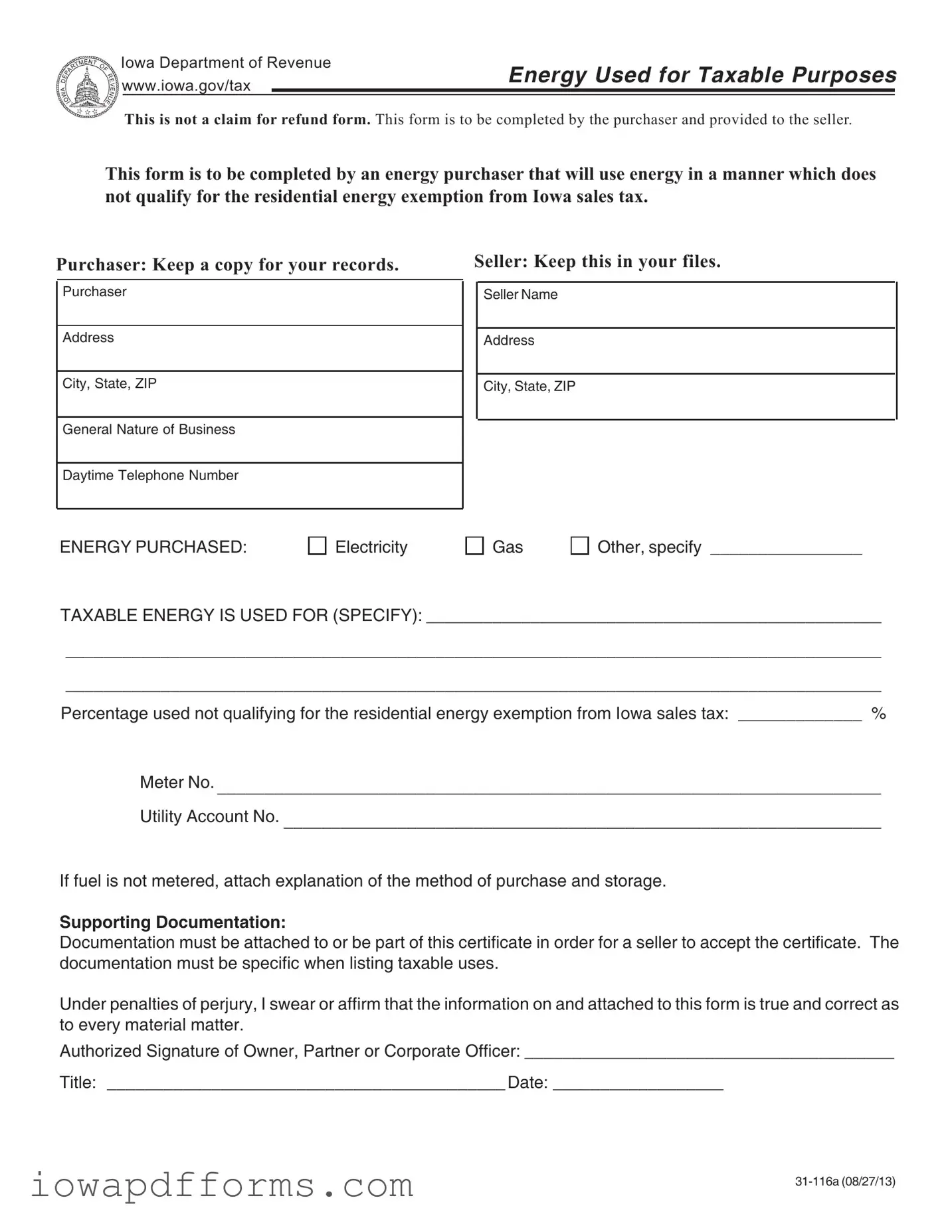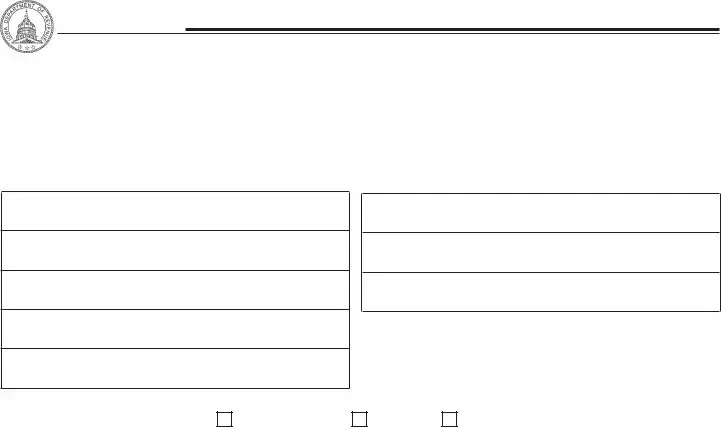The Iowa 31 116A form is similar to the IRS Form W-9, which is used to provide taxpayer identification information. Just as the Iowa form requires purchasers to declare their energy use for tax purposes, the W-9 form collects essential information from individuals and businesses to ensure accurate reporting of income to the IRS. Both forms emphasize the importance of accuracy and the need for the signer to affirm the truthfulness of the information provided. This common requirement helps prevent fraud and ensures compliance with tax laws.
Another document that shares similarities with the Iowa 31 116A form is the Certificate of Exemption form used in various states. This form allows buyers to claim exemptions from sales tax for specific purchases, much like how the Iowa form addresses energy used for taxable purposes. Both documents require the purchaser to provide details about the nature of the purchase and the intended use, ensuring that only qualifying transactions are exempt from tax obligations. Documentation supporting the claims is also a common requirement in both cases.
The Iowa 31 116A form is akin to the Sales Tax Exemption Certificate used in many states. This certificate serves a similar purpose by allowing businesses to make purchases without paying sales tax if the items are intended for resale or other exempt purposes. Both forms require detailed information about the purchaser and the nature of the transaction, ensuring that sellers can verify the legitimacy of the tax exemption. The emphasis on maintaining proper records is crucial for compliance with tax regulations.
Additionally, the Iowa form resembles the Utility Tax Exemption form, which allows certain entities, such as non-profits or government agencies, to claim exemptions on utility purchases. Similar to the Iowa 31 116A, this form mandates that the user specify how the energy will be used and provides a framework for documentation. Both forms help clarify the circumstances under which tax exemptions apply, ensuring that only eligible entities benefit from these provisions.
The Iowa 31 116A form is also comparable to the Business Personal Property Declaration form. This document requires businesses to report personal property used in their operations, which can include energy-related assets. Both forms serve the purpose of ensuring transparency in tax reporting, with each requiring detailed information about the use of resources. The need for accurate reporting and the potential for penalties for misinformation are common threads between the two forms.
Another similar document is the Form ST-3, which is a sales tax exemption certificate used in various states. This form allows purchasers to buy items without paying sales tax if the items are intended for resale or other exempt purposes. Like the Iowa 31 116A, the ST-3 requires the purchaser to provide specific details about the transaction, including the nature of the business and the intended use of the purchased items. Both forms aim to ensure compliance with tax laws while facilitating legitimate tax-exempt transactions.
The Iowa 31 116A form can also be compared to the 501(c)(3) Exemption Application, which is submitted by non-profit organizations seeking tax-exempt status. Both documents require detailed information about the entity's operations and the intended use of resources. While the Iowa form focuses specifically on energy use for tax purposes, the 501(c)(3) application serves a broader purpose in establishing an organization's eligibility for various tax exemptions. Both emphasize the importance of maintaining accurate records to support claims made.
In the context of rental properties, prospective tenants often need to fill out various forms to ensure compliance and suitability, with one key document being the Rental Application form. This form collects essential personal, employment, and financial information that landlords review to determine eligibility and responsibility, acting as a cornerstone for the leasing process.
Another document that mirrors the Iowa 31 116A form is the Sales Tax Resale Certificate. This certificate allows businesses to purchase goods intended for resale without paying sales tax upfront. Both forms require the purchaser to provide information about their business and the intended use of the purchased items. The emphasis on proper documentation and compliance with tax regulations is a key similarity, ensuring that only qualifying transactions are exempt from sales tax.
The Iowa 31 116A form also has similarities with the Tax Exempt Use Certificate, which is used to claim exemptions on certain purchases. Much like the Iowa form, this certificate requires detailed information about the purchaser and the specific use of the purchased items. Both documents are designed to ensure that tax exemptions are applied correctly, helping to prevent misuse and maintain the integrity of tax systems.
Finally, the Iowa 31 116A form is similar to the Energy Efficiency Tax Credit application. This application allows individuals and businesses to claim tax credits for energy-efficient upgrades. Both documents require users to specify how energy is utilized and the benefits derived from it. They emphasize the importance of accurate reporting and the need for supporting documentation, ensuring that tax incentives are granted only to eligible applicants.


